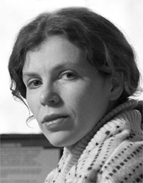 Yulia Latynina
Yulia LatyninaThe program to reform of the Russian Academy of Sciences essentially means its ruin. First, the proposed changes will deprive the academy of its financial independence. From now on, government officials, and not the academy, will control the money allocated to scientific research. That, of course, is absurd.
Second, the Russian Academy of Sciences will be merged with academies of medical and agricultural sciences, and people with lesser academic degrees will be added to the list of official scientists. That devalues the status of every full-fledged Russian Academy of Sciences scientist.
Konstantin Novoselov and Andre Geim won the Nobel Prize in Physics in 2010. The two men are now members of the Royal Society in London and both have been knighted. But neither are members of the Russian Academy of Sciences.
This year's Fundamental Physics Prize — founded in 2012 by Internet entrepreneur Yury Milner and often dubbed "Russia's Nobel Prize" — was awarded to Alexander Polyakov, who has worked at Princeton University since 1989. Polyakov, born in 1945, became a corresponding member of the Russian Academy of Sciences in 1984. His work on string theory is considered classic theoretical physics, and he also received the Dirac Medal in 1986 and the Lorentz Medal in 1994. But he never became a full member of the Russian Academy of Sciences.
Three of last year's recipients of the Fundamental Physics Prize were Russians: Andrei Linde, Alexei Kitayev and Maxim Kontsevich.
Not one of them is either a full member or even an associate member of the Russian Academy of Sciences.
According to the charter of the Russian Academy of Sciences, the current members select new ones by "electing scholars who have enriched science with works of major scientific importance."
The Russian Academy of Sciences currently has 531 full members. This means the country is really gifted with a lot of serious scientific talent. After all, that's 531 people who have all enriched science with works of greater scientific importance than Geim, Novoselov, Linde, Kontsevich or Kitayev.
Who are these brilliant members of the Russian Academy of Sciences? Well, there's Viktor Ishayev, former governor of the Khabarovsk region and now the presidential envoy to the Far Eastern Federal District. A full member since 2008, he has apparently "enriched science" much more than Linde, who has only an inflationary model of the universe to his name.
Then there's Boris Kuzyk, who served as advisor to a former head of Rosvooruzheniye, which was later merged into Rosoboronexport. In 2001, Kuzyk published an 800-page definitive work titled "Russia in the World Arms Market" that was presented to reviewers as a unique publication for its breadth of information and depth of analysis. But as it turned out, 99 percent of the book had been penned by a ghostwriter who plagiarized the information from work by well-known Russian military analysts Konstantin Makiyenko and Ruslan Pukhov that was available on the website of the Center for Analysis of Strategies and Technologies. Kuzyk was forced by a court ruling to pay compensation.
But topping them all is Russian Academy of Sciences Vice President Alexander Nekipelov, who leading Russian economist Konstantin Sonin once exposed for having plagiarized his monograph "The establishment and functioning of the economic system" from two standard but outdated U.S. textbooks.
The Russian Academy of Sciences is the last surviving Soviet-era social institution, and this puts it in a very weak position.
Yulia Latynina hosts a political talk show on Ekho Moskvy radio.
A Message from The Moscow Times:
Dear readers,
We are facing unprecedented challenges. Russia's Prosecutor General's Office has designated The Moscow Times as an "undesirable" organization, criminalizing our work and putting our staff at risk of prosecution. This follows our earlier unjust labeling as a "foreign agent."
These actions are direct attempts to silence independent journalism in Russia. The authorities claim our work "discredits the decisions of the Russian leadership." We see things differently: we strive to provide accurate, unbiased reporting on Russia.
We, the journalists of The Moscow Times, refuse to be silenced. But to continue our work, we need your help.
Your support, no matter how small, makes a world of difference. If you can, please support us monthly starting from just $2. It's quick to set up, and every contribution makes a significant impact.
By supporting The Moscow Times, you're defending open, independent journalism in the face of repression. Thank you for standing with us.
Remind me later.





